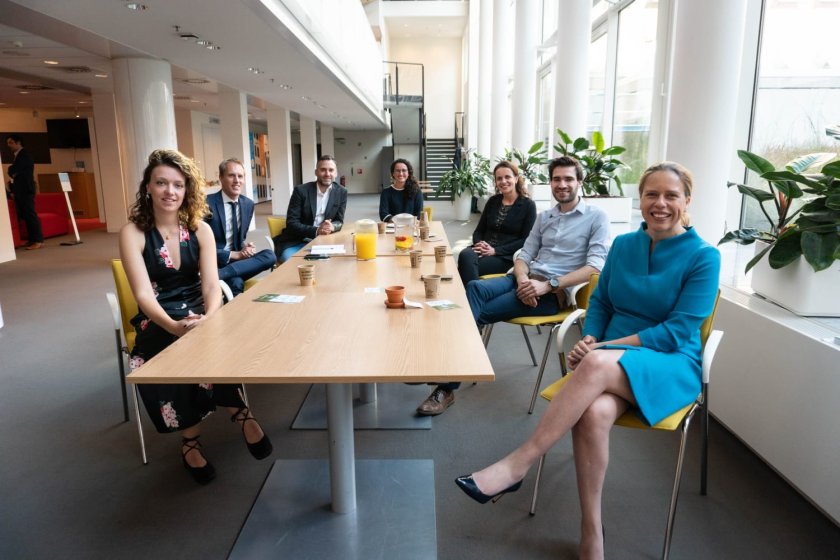
News
Rob Dortmans to conquer the Netherlands with sustainable home-grown salmon
The production of sustainable, land-based farmed salmon involves a cycle in which water and fertilisers are preserved. Neither antibiotics nor chemicals play a part in this process. Rob Dortmans aims to conquer the Netherlands with Van Holland Zalm; read on to learn about a pioneer who wants to make a difference.
Rob grew up in the rigorous world of cattle farming. After completing his Bachelor’s degree in Animal Sciences in Wageningen, he opted for the Master’s in Aquaculture, complemented by a Master’s track in Entrepreneurship. “I’d always wanted to start my own business and I saw that there were opportunities at the interface of sustainable livestock farming systems and aquaculture. I’m well aware of the changing social views on food production. What’s more, I’ve always found it strange that the majority of Dutch food that’s produced is exported, while much of what we eat is imported from abroad.”
Extensive project
The idea for an independent land-based salmon farm originated during the first year of his studies and evolved into a major project in the years that followed. Together with his associate Maurice van den Broek, he collaborated with fellow campus residents like the Aquaculture & Fisheries chair group, StartLife and StartHub, and also worked with engineering and consultancy firm Witteveen+Bos (who also have a branch on Wageningen Campus). Food Valley, the Province of Gelderland, OostNL and the Municipality of Ede also backed the idea.
Fully controlled environment
Van Holland Zalm will cultivate salmon in a fully controlled environment, in land-locked basins. “The advantage is that using the best water quality will enable us to produce salmon throughout the entire year. Ninety-nine-point seven percent of the water is recycled and is actually cleaner when it returns to the source than it was when it entered the farm. Fertilizers are filtered out of the water and then condensed, so that they remain in the cycle and are used as nutrients in the food production process. And we maintain the highest animal welfare standards, without using antibiotics or chemicals.”
No mass production
Rob’s aim for the future farm, which will be built at a location in the Municipality of Ede, is that it will provide five to ten percent of Dutch consumers with sustainable salmon. “We’re an independent company and we cover the entire chain, from the egg to the finished product. Because we’ve eliminated the need to ship to other links in the chain, CO2 emissions have been reduced by 50-75% and we’re able to deliver fresh fish on a daily basis. In other parts of the world, there are 15-hectare salmon farms, which are far beyond the scale of what we in the Netherlands refer to as factory farms. When it comes to such large-scale production, we’ve deliberately drawn the line: we’re not interested in mass production at the lowest price, but we do believe in a sustainable product that can rely on public support.”
Everyone is welcome
The farm will initially be focusing on delivering fresh fish to wholesalers on a daily basis, but also believes that there will eventually be an opportunity to supply directly to the retail sector. Moreover, in the near future everyone will be welcome to come and buy their own fresh salmon at the farm: “We want to be an accessible company that shows everyone that we fit into a natural environment. Because that’s also one of the huge advantages of breeding fish under completely independent conditions: you don’t create any dust pollution, or cause offensive odours or noise pollution.”

Minister Schouten is a fan
Although the pandemic has meant that Rob is currently working from home, he will be working from his office in the Plus-Ultra II building in the future. Construction is planned to commence in the second half of 2021. The first batch of sustainable, home-grown salmon should be finding its way to Dutch consumers in 2023. Rob has been informed that Carola Schouten (who is the Dutch Minister of Agriculture, Nature and Food Quality) is already a fan: “Together with other entrepreneurs who aim to transform Dutch food production, we got the chance to have a coffee with her on Budget Day. Our initiative fits in with the minister’s efforts to achieve a transition in the agricultural sector. If you want to put out a fire, you’re going to need more than a few small buckets of water. A grander scale is required to ensure that an impact is made. We’re already taking one big step with just one farm.”
